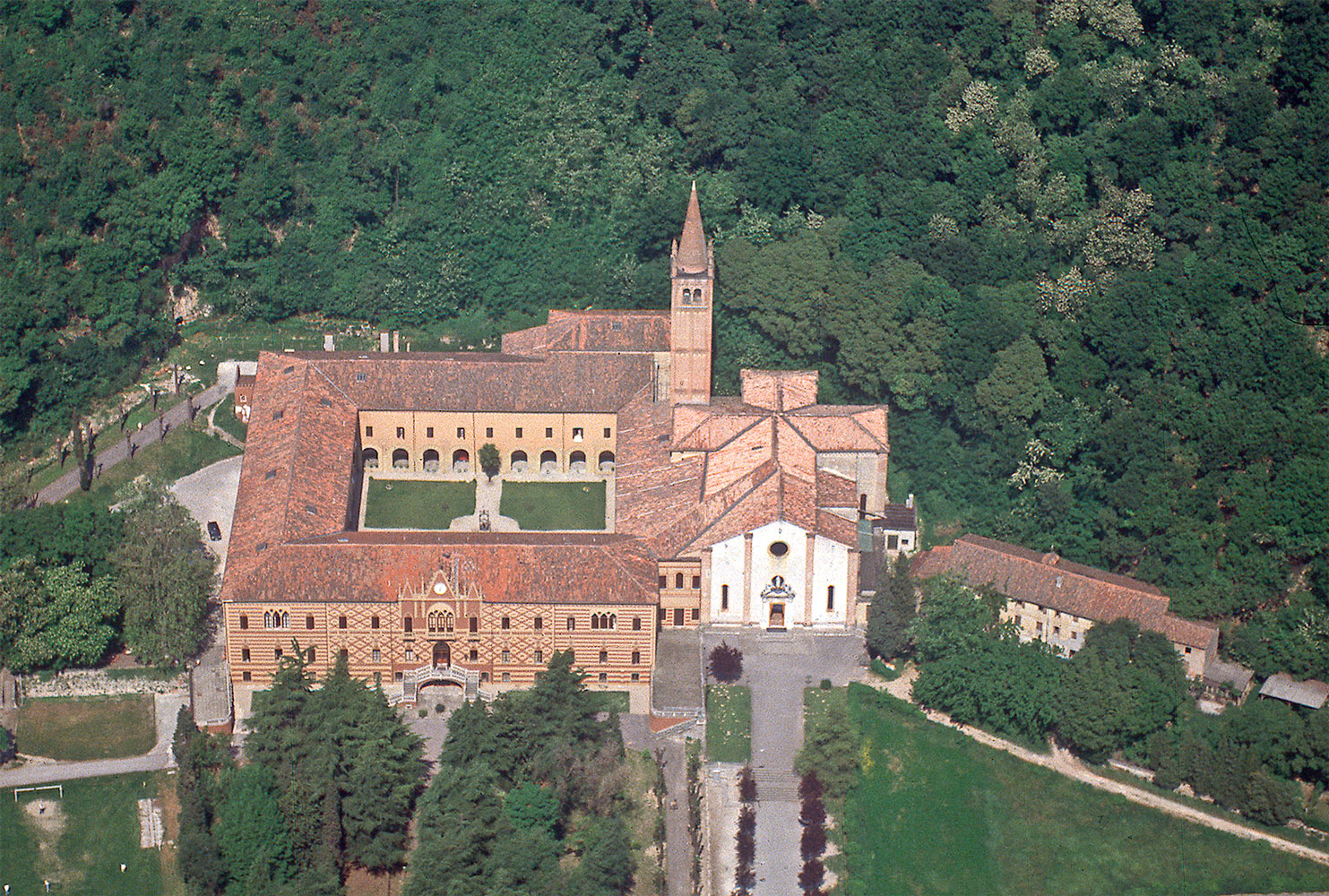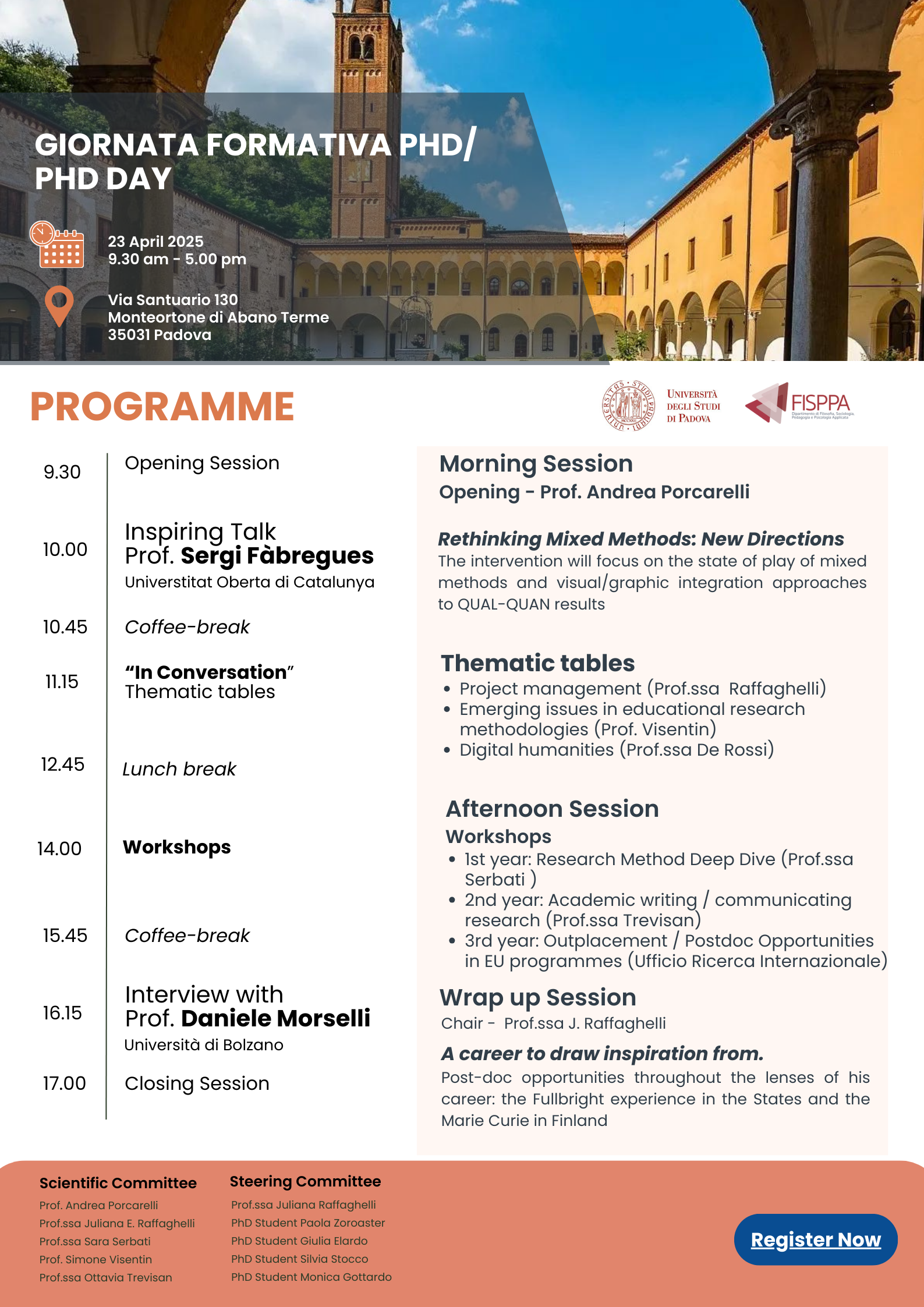

This year’s PhD Training Day returns to Monteortone, just beyond Abano Terme. Lying at the foot of the Euganean Hills, it is described as quiet, spacious, and removed just enough from the everyday to allow for a different kind of conversation. Those who have attended in the past speak of its cloistered courtyard, the calm of its surroundings, and the way the atmosphere seems to encourage slower, more generous discussions. It is not a typical venue for academic training, and perhaps that is part of what makes it work.
Organized by the doctoral research community with the support of the Department of Philosophy, Sociology, Pedagogy and Applied Psychology (FISPPA), the day is structured around a series of shared sessions, conversations, and workshops. The program has been made possible by a wonderful Steering Committee composed of Giulia Elardo, Monica Gottardo, Silvia Stocco and Paola Zoroaster, with the support of Prof. Juliana Raffaghelli and Prof. Andrea Porcarelli, coordinators of the PhD programme. The event brings together doctoral researchers, faculty, and invited speakers around a shared interest in what scholarly formation looks like when inquiry is not only rigorous, but also generous.
The day begins with a keynote by Prof. Sergi Fàbregues (Universitat Oberta de Catalunya), focusing on current developments in mixed methods research. His talk will explore how qualitative and quantitative approaches can speak to each other more meaningfully, with a particular focus on visual and graphic techniques. It is a conversation that continues to matter across disciplines, especially where methods intersect but do not always align with ease.
Following the keynote, the morning continues with thematic tables focused on project management (Prof. Juliana Raffaghelli ), digital humanities (Prof. Marina de Rossi ) , and methodological innovation in educational research (Prof. Simone Visentin ). Each is facilitated by faculty actively engaged in the topics under discussion, and each invites participants to contribute from within their own research contexts. The goal here is less about presenting answers and more about opening questions: what is emerging, what is shifting, and how researchers are responding.
In the afternoon, the structure shifts toward smaller, year-specific workshops designed to meet doctoral researchers where they are. First year participants will engage with questions of methodological design under the guidance of Prof. Sara Serbati . Second year researchers will work with Prof. Ottavia Trevisan on developing their academic voice through writing and communication. Third year candidates will meet with representatives from the International Research Office from UNIPD to explore funding opportunities and professional pathways beyond the dissertation.
The day concludes with a session chaired by Prof. Juliana Raffaghelli, featuring Prof. Daniele Morselli (University of Bolzano), who will offer a more personal perspective drawn from his academic path across Italy, the United States, and Finland. Speaking to the transitions that often follow doctoral research, both practical and intellectual, Prof. Morselli will share his experience of building an academic career across institutions and countries. The session brings the day to a close by opening up broader questions about what comes next and how researchers continue to shape their paths beyond the PhD.
The structure of the day, however, is only part of what gives it meaning. As Giulia Elardo, one of the organizers, puts it: “To me, it’s an opportunity for everyone to develop, ask questions, and have a pleasant encounter with teachers and colleagues. I am very happy because a nice group of professors have now given generous willingness to participate and get their hands dirty with us.” That willingness, to step outside of formal roles and into a more horizontal exchange, is what shapes the tone of the event.
While sessions are scheduled, space has been left open for the conversations that do not fit neatly on a schedule: for side conversations, for coffee under the cloister, for the kind of reflection that often happens in between things. Academic development is not always driven by content alone. Often, it takes stepping outside the usual context long enough to notice where one stands and to hear from others who are working through similar questions.
The event will take place on Wednesday, 23 April 2025 , from 9:30 to 17:00, at Via Santuario 130, Monteortone di Abano Terme (PD). Registration is currently open and available here: Registration Form and Downloadable Programme.